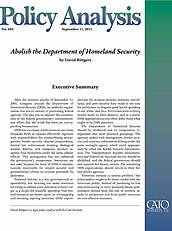After the terrorist attacks of September 11, 2001, Congress created the Department of Homeland Security (DHS), an umbrella organization that would oversee 22 preexisting federal agencies. The idea was to improve the coordination of the federal government’s counterterrorism effort, but the result has been an ever-expanding bureaucracy.
DHS has too many subdivisions in too many disparate fields to operate effectively. Agencies with responsibilities for counterfeiting investigations, border security, disaster preparedness, federal law enforcement training, biological warfare defense, and computer incident response find themselves under the same cabinet official. This arrangement has not enhanced the government’s competence. Americans are not safer because the head of DHS is simultaneously responsible for airport security and governmental efforts to counter potential flu epidemics.
National defense is a key governmental responsibility, but focusing too many resources on trying to defend every potential terrorist target is a recipe for wasteful spending. Our limited resources are better spent on investigating and arresting aspiring terrorists. DHS responsibilities for aviation security, domestic surveillance, and port security have made it too easy for politicians to disguise pork barrel spending in red, white, and blue. Politicians want to bring money home to their districts, and as a result, DHS appropriations too often differ from what ought to be DHS priorities.
The Department of Homeland Security should be abolished and its components reorganized into more practical groupings. The agencies tasked with immigration, border security, and customs enforcement belong under the same oversight agency, which could appropriately be called the Border Security Administration. The Transportation Security Administration and Federal Air Marshals Service should be abolished, and the federal government should end support for fusion centers. The remaining DHS organizations should return to their former parent agencies.
Terrorism remains a serious problem, but policymakers ought to be more candid with the American public. Instead of pandering to fear and overreacting to every potential threat, policymakers should keep the risk of terrorist attacks in perspective and focus public resources on cost-effective measures.

This work is licensed under a Creative Commons Attribution-NonCommercial-ShareAlike 4.0 International License.

